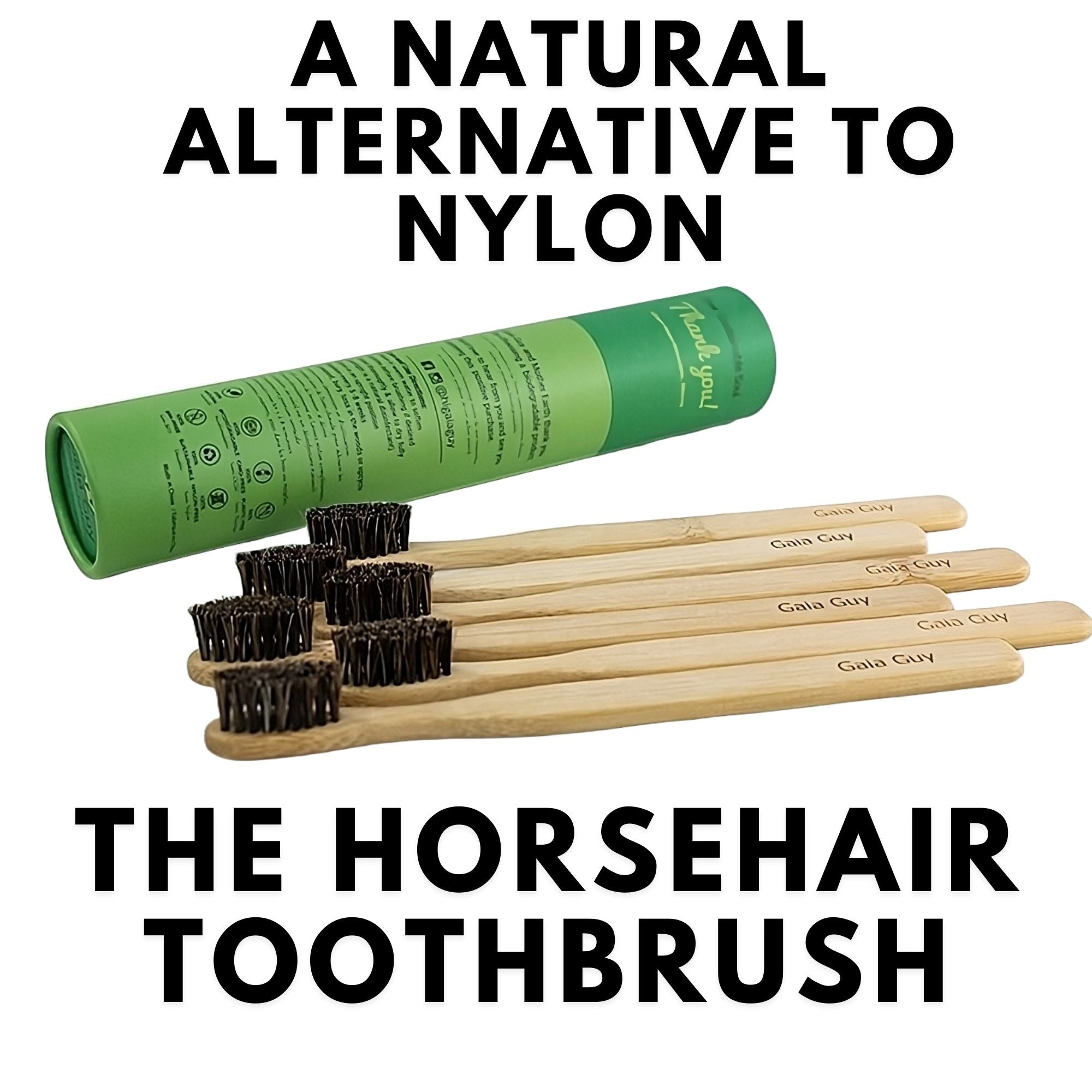In recent years, natural hydroxyapatite (HAp) has been gaining traction as an alternative to fluoride in toothpaste. But what exactly is hydroxyapatite, and why should you care about it for your oral health? In this post, we’ll dive into the science behind natural hydroxyapatite, how it helps with tooth sensitivity, and why it’s a compelling ingredient in natural toothpaste.

What Is Hydroxyapatite and How Does It Work?
Hydroxyapatite is a naturally occurring mineral form of calcium apatite, making up approximately 97% of tooth enamel and 60% of bones. It’s a bioactive material, meaning your body recognizes it and can use it effectively to strengthen teeth. Unlike synthetic chemicals, hydroxyapatite is biocompatible, so it's both safe and functional for dental health.
When applied to teeth, hydroxyapatite can help remineralize enamel by filling in the microscopic cracks and fissures in your teeth. This remineralization strengthens enamel and can help prevent cavities, tooth decay, and erosion caused by acids and wear.
Why Choose Natural Hydroxyapatite Over Nano-Hydroxyapatite?
If you’ve been researching hydroxyapatite toothpaste, you’ve probably come across the term “nano-hydroxyapatite.” While both natural and nano versions of HAp are effective, there are some key differences.
-
Natural Hydroxyapatite (HAp): Larger particles that stay on the surface of the enamel, primarily working to fill cracks and repair damaged areas. It’s less studied than nano-hydroxyapatite but is still considered effective for improving tooth strength and sensitivity.
-
Nano-Hydroxyapatite (n-HAp): Much smaller particles that can penetrate deeper into the enamel to help with deeper remineralization. Nano-hydroxyapatite has been extensively studied and is widely used in Japan.
Though nano-hydroxyapatite has a deeper action, many people prefer natural HAp because it is less processed and more aligned with the desire for “natural” products. It’s also worth noting that because natural HAp particles are larger, they primarily repair the outermost layers of enamel, which can still result in significant improvements to oral health.
How Does Natural Hydroxyapatite Help with Tooth Sensitivity?
One of the main reasons people turn to hydroxyapatite toothpaste is for relief from tooth sensitivity. Tooth sensitivity often occurs when the enamel becomes thin or worn, exposing the underlying dentin, which contains tiny tubules that lead to the nerves inside the tooth. When these tubules are exposed to hot, cold, or acidic substances, it can cause pain or discomfort.
Hydroxyapatite works by filling these exposed tubules, creating a protective barrier over the dentin and reducing sensitivity. In fact, studies have shown that even a 2% concentration of HAp can effectively reduce tooth sensitivity. With natural HAp toothpaste containing 3%, users can expect significant relief from sensitivity while also strengthening the enamel.
Benefits of Hydroxyapatite for Your Oral Health
Natural hydroxyapatite has a range of benefits, making it a powerful ingredient in toothpaste, especially for those looking to avoid fluoride or harsh chemicals. Here are some of the main advantages:
-
Enamel Remineralization: Hydroxyapatite can replace lost minerals and strengthen tooth enamel, which helps prevent cavities, decay, and erosion. Regular use of HAp toothpaste leads to stronger, more resilient teeth.
-
Reduced Sensitivity: By filling in exposed dentin tubules, hydroxyapatite effectively reduces tooth sensitivity, making it easier to enjoy hot, cold, and acidic foods without discomfort.
-
Natural and Biocompatible: Hydroxyapatite is a natural material that the body readily accepts, making it a safer and more natural alternative to synthetic chemicals.
-
Helps Prevent Cavities: By remineralizing enamel and filling in tiny cracks where bacteria can accumulate, HAp helps prevent cavities and tooth decay.
-
Whitens Teeth Naturally: Regular use of hydroxyapatite toothpaste can also help remove surface stains, leaving your teeth looking naturally whiter without the need for harsh abrasives or bleach.

Why Natural Hydroxyapatite Toothpaste Is a Great Fluoride Alternative
Many people are seeking fluoride alternatives due to concerns over the potential side effects of fluoride use, such as fluorosis (a condition caused by excessive fluoride exposure) or because they simply prefer a more natural option. Natural hydroxyapatite is a compelling alternative because it offers many of the same benefits as fluoride, including remineralization and cavity prevention, but without the concerns linked to fluoride.
While fluoride works by hardening the enamel and making it more resistant to acid attacks, hydroxyapatite takes a more natural approach by actually filling in and repairing enamel damage. This makes it especially useful for people with damaged enamel, tooth sensitivity, or those who prefer a natural approach to oral health.
How to Choose the Right Hydroxyapatite Toothpaste
When selecting a hydroxyapatite toothpaste, it’s important to consider the following factors:
-
Concentration: Look for toothpastes that contain at least 2-3% hydroxyapatite for effective results. This level is backed by studies showing it can reduce sensitivity and support remineralization.
-
Other Ingredients: If you’re looking for a truly natural toothpaste, make sure to choose one that is free from synthetic chemicals, SLS (sodium lauryl sulfate), and artificial flavors or preservatives.
-
Certifications: Opt for products that are cruelty-free, vegan, and made with sustainably sourced ingredients if these factors are important to you.
The Science Behind Hydroxyapatite: What Research Says
Though natural hydroxyapatite hasn’t been studied as extensively as its nano counterpart, the existing research is promising. Studies suggest that HAp can effectively reduce sensitivity, promote remineralization, and help prevent cavities. A study published in Biomaterials highlighted that even a 2% concentration of HAp was sufficient to reduce sensitivity and aid in remineralizing enamel.
While more research is needed to determine the optimal concentration of natural hydroxyapatite in toothpaste, early results show that it’s a highly effective ingredient for maintaining oral health.
Final Thoughts: Why Hydroxyapatite Is the Future of Natural Oral Care
If you’re looking for a natural way to care for your teeth without relying on synthetic chemicals or fluoride, natural hydroxyapatite toothpaste is an excellent option. With its proven ability to remineralize enamel, reduce sensitivity, and help prevent cavities, it’s no wonder this ingredient is becoming a popular choice among those looking for a more natural approach to oral care.
By choosing a toothpaste with natural hydroxyapatite, you’re not only taking a step toward stronger, healthier teeth, but you’re also aligning with a more sustainable and natural way of taking care of your body.











